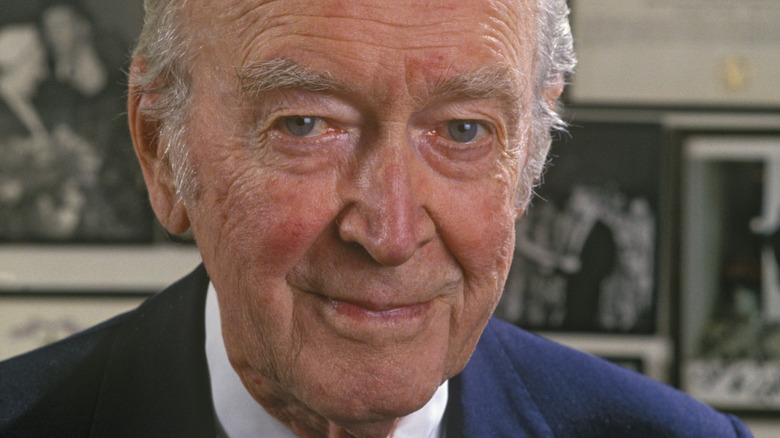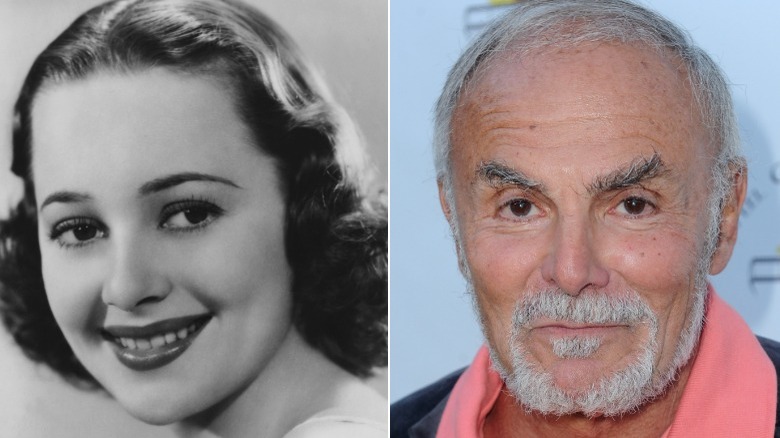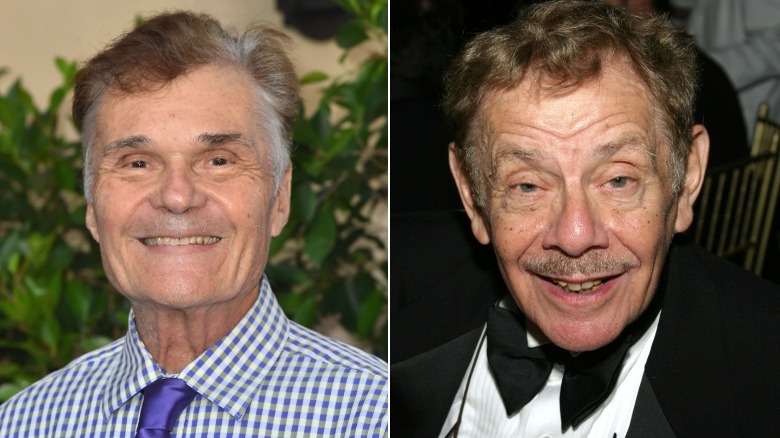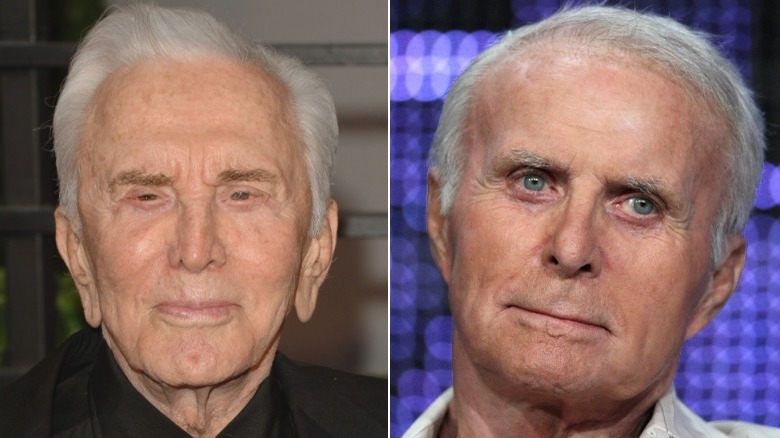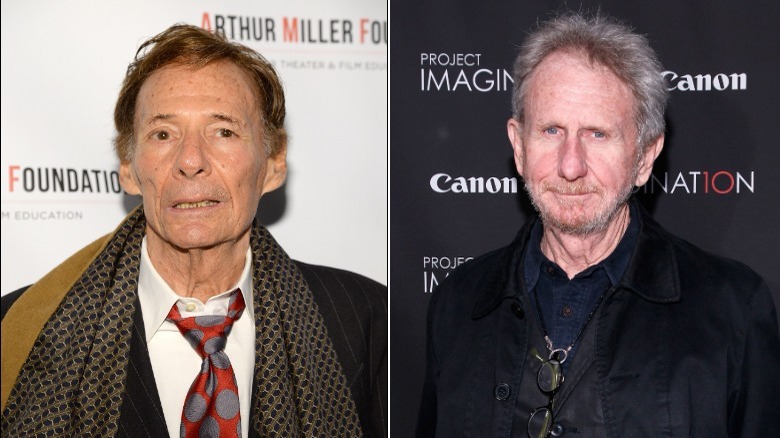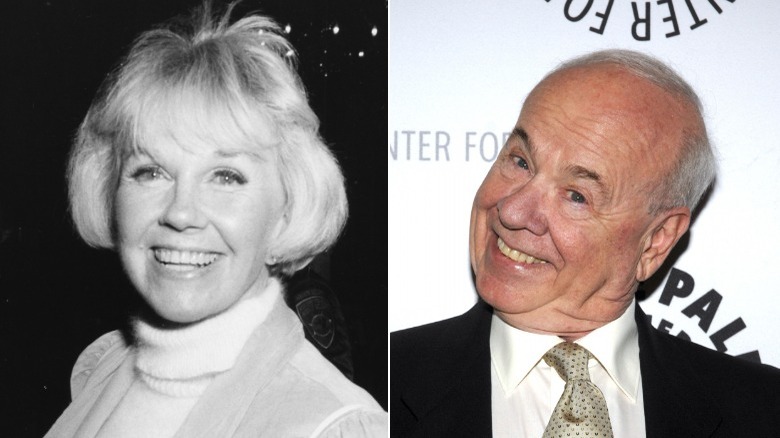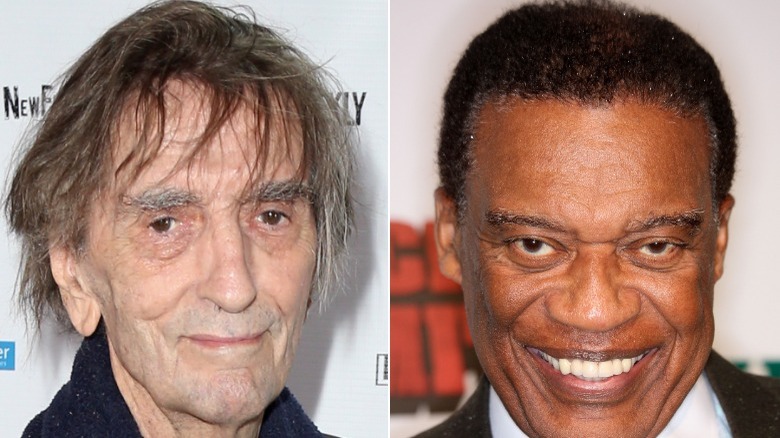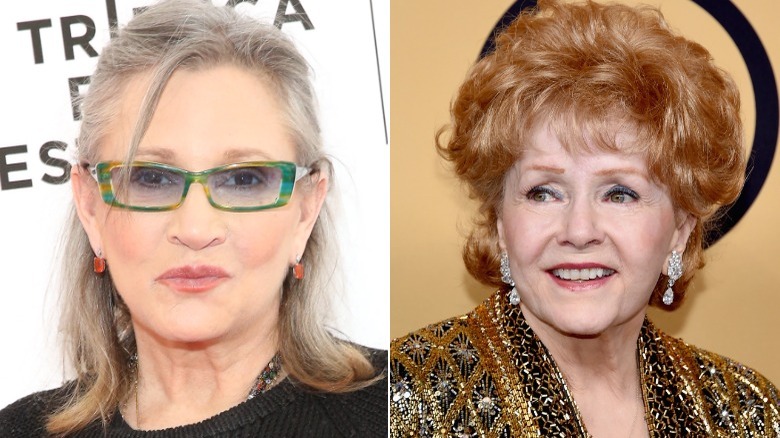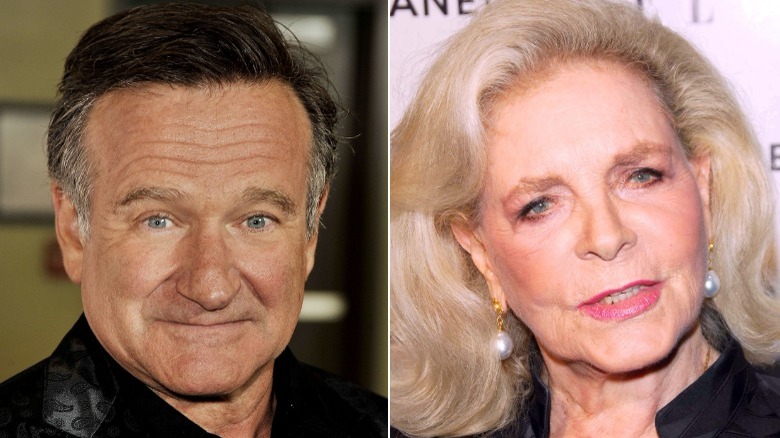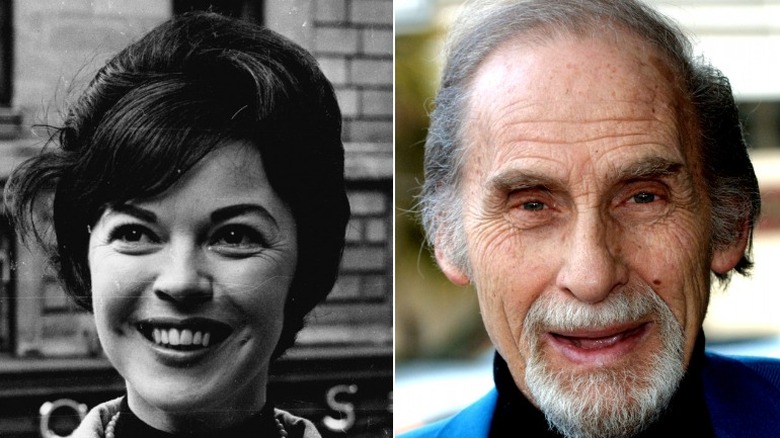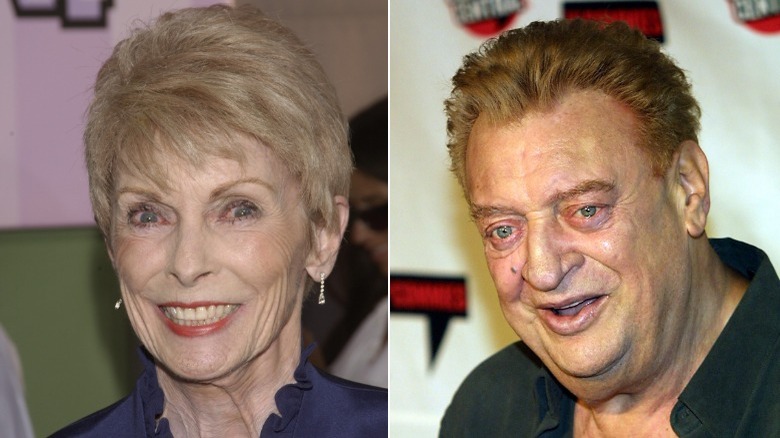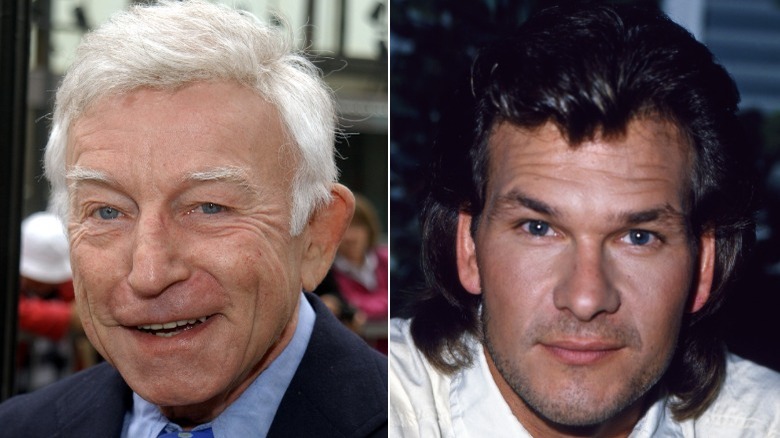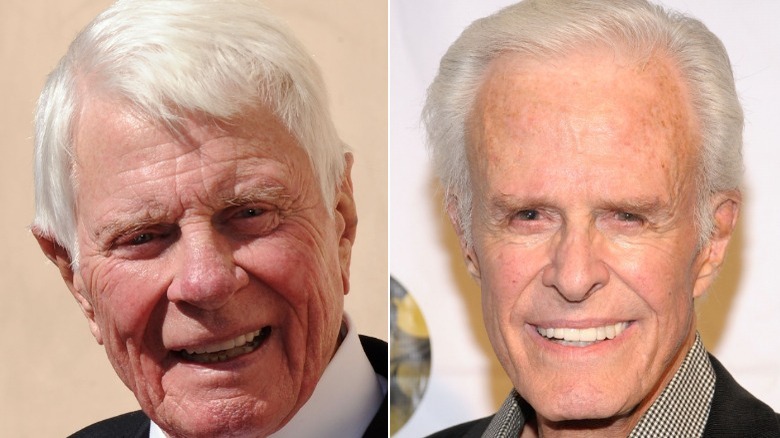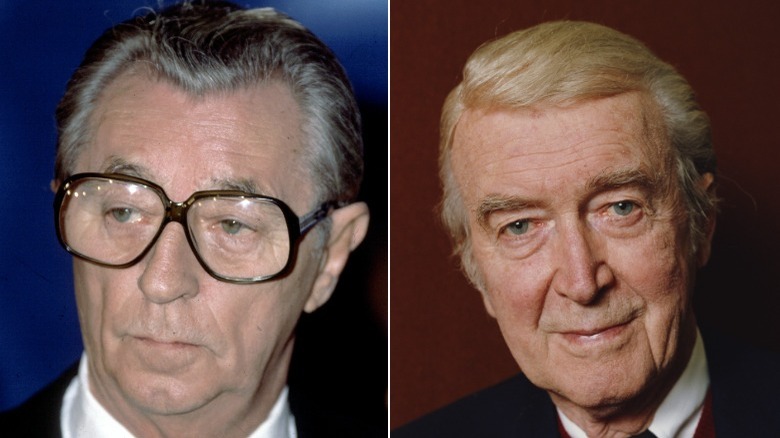Actors Who Died Within Days Of Each Other
Coincidence and fame have led many to believe in the so-called "Rule of Three," which says that when a famous person dies, it's likely that two more famous people will die shortly after that. This is one of those cultural signifiers that doesn't mean anything, because statistically there's a good chance that someone we deem to be "famous" will die within a few days of another famous death. Still, it's hard to resist thinking of links between these deaths, comparing and contrasting the parties involved.
That game is even more fun when you restrict the dead pool to strictly actors, as links between performers tend to be inevitable, especially if they had long careers before passing on. It turns out there have been a surprising number of times that actors died within a few days of each other — or even died on the same day. Call it probability, call it fate, but some of the links between the departed are fascinating. And for others, there are no links at all, other than that they were famous. Let's take a look at actors who died within days of each other.
John Saxon and Olivia de Haviland had long careers
When Olivia de Havilland died on July 25, 2020 at the age of 104, she was the last surviving member of Hollywood's "Golden Age" studio system. Her most famous role was her Oscar-nominated portrayal of sweet Melanie, the woman who married Scarlett O'Hara's unrequited crush Ashley in the 1939 epic "Gone with the Wind." After starting her career in Errol Flynn-led action films such as "Captain Blood" and "The Adventures of Robin Hood" (where she played a virtuous Marian), she became known for playing good girls. She later won Oscars for "To Each His Own" and "The Heiress," but her most challenging role was that of a woman in a mental institution in "The Snake Pit." De Havilland was a founding member of the Screen Actors Guild and famously sued Warner Bros. for trying to hold her past the date of her contract.
John Saxon died on the same day. Like de Havilland, he had been an actor his entire adult life. He was best known for his roles as a cerebral, gentlemanly tough guy. He won a Golden Globe in 1958 and enjoyed a varied career that took advantage of his physicality and knowledge of martial arts. Best known as the co-star of 1973's "Enter the Dragon" with Bruce Lee, he later had a memorable turn in "A Nightmare on Elm Street," starting a run of horror film appearances.
Fred Willard and Jerry Stiller were two vital comedians
Comedic genius Fred Willard died on May 11, 2020 after a lifetime of playing oblivious, thickheaded characters. He mastered this craft on the '70s subversive talk show spoof "Fernwood Tonight" as Jerry Hubbard, a character who was equal parts obnoxious, blandly agreeable, and utterly unaware of the reactions of others. He earned Emmy nominations for his roles in "Everybody Loves Raymond" and "Modern Family," but he was probably best known as a member of Christopher Guest's improv movie ensemble. That began with his portrayal of a hopelessly square Air Force officer in 1984's "This Is Spinal Tap," but his most hilarious role may have been as a wildly inappropriate announcer in 2000's "Best in Show."
Another comedy legend, Jerry Stiller, died on May 15, 2020. His persona was the opposite of Willard's, with an unrelentingly abrasive personality that used those closest to him as targets. Stiller gained fame as a comedy duo on television in the '50s with his wife Anne Meara, an act that emphasized their ethnic and physical differences. He later pivoted to theater and Broadway before landing the role of Frank Costanza on "Seinfeld" in 1993, which earned him his only Emmy nomination. He followed that up with a similar but more nuanced role on "The King of Queens," one that allowed him to show some emotional vulnerability.
Kirk Douglas and Robert Conrad played tough guys
Legendary Hollywood leading man and tough guy Kirk Douglas died on February 5, 2020 at the age of 103. He first came to prominence as a rough but sensitive leading man in the '50s, earning Academy Award nominations for 1950's "Champion," 1953's "The Bad and the Beautiful," and as Vincent van Gogh in 1956's "Lust for Life." He was also in the classic 1957 Stanley Kubrick war film "Paths of Glory." He was possibly best known for 1960's sword-and-sandal epic "Spartacus," as a gladiator who sparked a rebellion. Douglas was able to break the infamous Hollywood blacklist with that film, as he got his friend Dalton Trumbo full credit as the screenwriter. His last role came when he was 90 years old, in the 2008 television movie "Empire State Building Murders."
Robert Conrad was another tough-guy actor, and he died on February 8, 2020. He was best known for playing Secret Service agent James West in the '60s steampunk western "The Wild, Wild West." He did all of his own stunts on this high-octane, funny, and frequently bizarre blend of science-fiction, spy tropes, and a Western setting. Conrad later starred as "Pappy" Boyington on the '70s show "Black Sheep Squadron," a visceral and realistic account of life in a World War II Air Force squadron. Conrad said he was proudest of his performance as a trapper in a television miniseries adaptation of James Michener's "Centennial" in 1978.
Ron Leibman and René Auberjonois were popular character actors
Versatile character actor Ron Leibman died on December 6, 2019. He starred in movies, television, and theater, winning accolades along the way — including an Emmy for playing a criminal-turned-lawyer in 1979's "Kaz," a show that was canceled after just one season. He won a Tony in 1993 for his performance in "Angels in America" as closeted lawyer Roy Cohn, who helped Joseph McCarthy's hunt for suspected Communists in America. Leibman was also quite adept at comedic roles, playing Jennifer Aniston's father in "Friends." More absurdly, he voiced Mallory Archer's love interest Ron Cadillac on "Archer" from 2013-'16.
René Auberjonois was similarly renowned on stage, screen, and television. He died on December 8, 2019 after a career that earned him a Tony and a couple of Emmy nominations. He won his Tony in 1970 for the play "Coco," which was about the fashion designer Coco Chanel, and picked up nominations on three other occasions. He played Father Mulcahy in the classic 1970 film "MASH" and worked steadily until he co-starred on the hit television show "Benson" in 1980. He excelled in portraying characters with fussy and permanently aggrieved personas, and he picked up an Emmy nomination for "Benson" in 1984. He later played fussy security chief Odo on "Star Trek: Deep Space Nine," and garnered another Emmy nomination in 2001 for his role as a judge on "The Practice."
Doris Day and Tim Conway were wholesome stars of stage and screen
Doris Day died on May 13, 2019, nearly 40 years after she retired show business. She was one of the most popular performers in the world during her heyday in the '50s and '60s as a true singing/dancing/acting triple threat. In 1956, she became the only person to ever score a No. 1 hit on the charts at the same time she was in the No. 1 box office hit. That song became her signature hit, "Que Sera, Sera," which she also sang in the Alfred Hitchcock film "The Man Who Knew Too Much." She was equally adept at comedy ("Please Don't Eat the Daisies") and romance ("Love Me or Leave Me"), with her perky, upbeat personality a constant draw. She earned a Golden Globe for "The Doris Day Show" in the late '60s, which was her last credit as an actor.
Tim Conway died on May 14, 2019, after a long and varied career. He was best known for his bone-dry, deadpan sense of humor on the '70s sketch comedy "The Carol Burnett Show," where he frequently caused his co-stars to break. He co-starred with Don Knotts in several gentle family comedy films like "The Apple Dumpling Gang," went on tour with Harvey Korman reprising their classic "Carol Burnett Show" sketches, and reinvented himself yet again with his "Dorf" videos in the '80s. He became popular with a younger generation by voicing Barnacle Boy on "SpongeBob SquarePants" in the '00s.
Harry Dean Stanton and Bernie Casey were cult movie stars
Harry Dean Stanton died on September 15, 2017, after a career of playing haunted, angry men. His trademark sunken eyes and gaunt face dominated the screen, and while he never won any major acting awards, he never lacked for work. After a long career on television that started in the '50s, he had a memorable turn in 1979's horror sci-fi classic "Alien." He started picking up roles in offbeat movies like "Escape from New York," "Last Temptation of Christ," and "Red Dawn," as well as the 1984 punk classic "Repo Man" and his first leading role in "Paris Texas." You never knew when he'd show up, be it as a security guard giving Bruce Banner a pep talk in "The Avengers" or on David Lynch's revival of "Twin Peaks."
Bernie Casey died on September 19, 2017, and he had a varied career as actor and artist after spending six years in the NFL. He starred in Blaxploitation films like "Cleopatra Jones" but also appeared in the David Bowie cult classic "The Man Who Fell to Earth." In 1977's "Brothers," he portrayed an activist similar to the assassinated Black Panther George Jackson. Casey brought a sense of gravitas to every role, making him a perfect comedic foil in movies like 1984's "Revenge of the Nerds" and 1989's "Bill and Ted's Excellent Adventure." Casey was also a poet and painter who had shows worldwide.
Carrie Fisher and Debbie Reynolds: a case of heartbreak
Carrie Fisher died on December 27, 2016. Best known as Leia Organa from the "Star Wars" franchise, Fisher was a lot more than that — she became a successful writer with "Postcards from the Edge," which was later turned into a movie. For years one of Hollywood's most in-demand script doctors, she also bracingly wrote about her struggles with mental illness and addiction as she continued to work as an actor, appearing in classics like "Hannah and Her Sisters" and "When Harry Met Sally."
Fisher's mother, Debbie Reynolds, died the next day on December 28, 2016. She became a star at age 20 starring in one of the greatest musicals of all time, 1952's "Singin' in the Rain." Her wholesome role in "Tammy And The Bachelor" in 1957 led to a hit song and permanently cemented her persona as a spunky, cute gal- next door. She worked in movies and television right up until she died, with memorable turns on "Will and Grace," cult films like Albert Brooks' "Mother," and voiceover work on shows like "Rugrats."
Robin Williams and Lauren Bacall: two icons from different generations
Robin Williams died on August 11, 2014, after a long career as a comedic and dramatic actor. Beginning as a stand-up comic, he got his big break on the television show "Mork and Mindy" in 1978. His frenetic sense of humor and ability to improvise made him a huge star, and it wasn't long before he was off to the movies, headlining hits like 1987's "Good Morning, Vietnam" as a subversive military DJ. He alternated between over-the-top comedic performances in 1993's "Mrs. Doubtfire" and 1992's "Aladdin" with more sensitive work, like the inspirational teacher in 1989's "Dead Poets Society," the delusional widower in 1991's "The Fisher King," and the psychologist in "Good Will Hunting" in 1997. That latter role won him an Oscar.
Lauren Bacall died on August 12, 2014 after a career as a husky-voiced, thinking person's femme fatale in a number of classics. She debuted as a total unknown in 1944's "To Have and Have Not" at the age of 20. Her line "You know how to whistle, don't you, Steve? You just put your lips together and ... blow" remains one of the most famous in Hollywood history. Bacall enjoyed a career revival in the early '00s with a number of film and television roles, including a cameo as herself on "The Sopranos."
Shirley Temple and Sid Caesar were pioneers
Shirley Temple Black died on February 10, 2014, standing as an example of a huge child star whose adult life sent them in a radically different direction. Starting with her first film, 1934's "Stand Up and Cheer," her dimples, curly hair, squeaky singing voice, and plucky disposition turned Temple into America's sweetheart. Her song "On The Good Ship Lollipop" in 1934's "Bright Eyes" was hugely popular. By the time she was ten, she was the biggest box-office draw in Hollywood, and President Franklin D. Roosevelt credited her for boosting the nation's morale during the Great Depression. Her career waned as she grew older, and she retired from acting in 1961 after a failed comeback on television. She later became known for her work in diplomacy.
Sid Caesar similarly shined bright in his career before burning out. At the dawn of television, he created a variety show that essentially set the template for modern sketch comedy with "Your Show Of Shows." Beginning in 1950, he did live television for nearly a decade with his wife and comedic partner Imogene Coca on a show that incorporated dance, opera, and popular music. It was the cutting edge of popular culture and art, with a writers' room that included the likes of Milton Berle, Carl Reiner, and Neil Simon. He continued to act late into his life.
Janet Leigh and Rodney Dangerfield got a lot of respect
Janet Leigh died on October 3, 2004. While she was a working actor for many years, she starred in three of the most critically acclaimed films of all time over a four-year span. The first was 1958's "Touch Of Evil," where she played Charlton Heston's wife. Director Orson Welles cast Leigh himself, sending her a note on how he was glad to work with her before she was even aware of the role. The second was 1960's "Psycho," where Leigh's morally ambiguous character is killed in the film's legendary shower scene. Finally, she was the romantic lead in 1962's "The Manchurian Candidate," the taut political thriller co-starring Frank Sinatra. She earned an Oscar nomination for "Psycho."
Rodney Dangerfield died on October 5, 2004. He transitioned into Hollywood with his rumpled personality and "I don't get no respect" catchphrase after years of work as a stand-up comic. He actually quit comedy for many years to earn a living for his family, starting over again when he was 42. His big break came stealing the show in "Caddyshack," a film that featured big names like Bill Murray and Chevy Chase. "Back to School" in 1986 was a wonderful spotlight for him as a comedian and a romantic lead, but he was terrifying cast against type in 1994's "Natural Born Killers." He was equally at home in 1992's "Ladybugs," a kids' sports movie.
Henry Gibson and Patrick Swayze had wild careers
Character actor Henry Gibson died on September 14, 2009. His stone face and deadpan expression made him ideal for absurdist comedy, like reading funny poems on the wacky sketch comedy show "Laugh-In" in the '70s. He was a featured player in Robert Altman's 1975 film "Nashville," playing a country music singer with sinister political ambitions. He was also memorable as a demented villain in 1989's "The 'Burbs." Gibson did a lot of voiceover work, most notably for "King of the Hill" toward the end of his career. Around the same time, he turned his age into crusty gravitas as a judge on "Boston Legal."
Patrick Swayze also died on September 14, 2009 after a wild career that was part musical theater, part tough guy, and part sensitive romantic lead. He was a Wolverine in 1984's "Red Dawn." He was a hunk in 1987's "Dirty Dancing." He was a quote-spinning bouncer in the 1989 camp classic "Road House." He avenged his death in the 1990 supernatural romance "Ghost." He was a surfing Buddhist criminal in 1991's "Point Break." He was a drag queen in 1995's "To Wong Foo, Thanks For Everything! Julie Newmar." No part was too over the top for Swayze, and he gave all of them total commitment and sincerity.
Peter Graves and Robert Culp were '60s spies
Peter Graves died on March 14, 2010 after a career portraying believably solemn and trustworthy good guys. His early career was highlighted in his role as a traitor in 1953's "Stalag 17" and later a long run on the '50s family western "Fury." He did a good job of taking ridiculous roles seriously in schlocky sci-fi films like "It Conquered the World," and became best known as Jim Phelps, the leader of a spy team in "Mission: Impossible," a smash hit from 1967-'73. Later, he spoofed his image in 1980's "Airplane," as one of many dramatic actors who sent up disaster movies. In the late '80s, his gravitas made him an ideal host of "Biography."
Robert Culp died on March 24, 2010, with his best-known role being that of Kelly Robinson on the '60s show "I Spy." Going undercover as a tennis star (his real-life tennis game was quite good), Culp co-starred with Bill Cosby on a show that crossed racial lines and emphasized humor as much as it did adventure. He followed that groundbreaking role with another in the 1969 sex comedy "Bob and Ted and Carol and Alice," which was about couples swapping partners. He later played the advisor to a superhero in the '80s show "The Greatest American Hero" and had a run on "Everyone Loves Raymond" in the late '90s.
Robert Mitchum and James Stewart were two of the greats
Robert Mitchum, who played some of the roughest, most terrifying villains in movie history, died on July 1, 1997. He brought a lot of his own pugnacious personality to characters who initially seemed low-key, but whose menace built as the story progressed. He was a star during the film noir era of the '50s, with "Out of the Past" being one of the best. His most memorable role came in one of the greatest films of all time, 1955's "The Night of the Hunter," as a crazed preacher who had "love" and "hate" tattooed on his knuckles. He was even more frightening in 1962's "Cape Fear," as a criminal stalking the lawyer who put him in prison.
James Stewart, one of the giants of acting, he died on July 2, 1997. He was nominated for five Oscars and won for 1940's "The Philadelphia Story" as a crusading reporter. He was known for his aw-shucks persona and slow drawl that either made him beloved and trustworthy as characters such as George Bailey in 1946's "It's A Wonderful Life," or a voyeuristic photographer in 1954's "Rear Window" and a man obsessed with a woman in 1958's "Vertigo." He earned another Oscar nomination for a man who thought he was being followed by a giant invisible rabbit in 1950's "Harvey."
